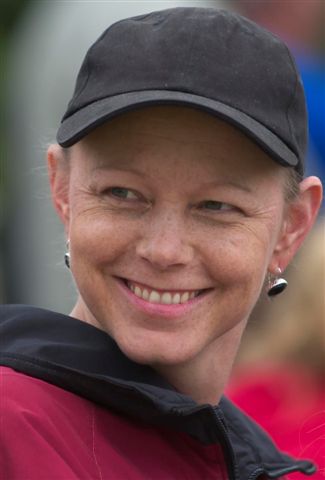
Corinne Weber leaves for Houston next week for a bone marrow transplant. TK Photo 6/7/03 TK03060702
Each death of a loved one has its own set of circumstances and presents its own challenges as far as grieving is concerned. But the death of a child is considered by many the most difficult grief assignment that life can hand us. It seems against the natural order, children dying before their parents. People said this to me often when my 31-year-old son Ken died of AIDS and later when my 42-year-old daughter Corinne died of Breast Cancer. Thanks to my father’s love of history and our trips to historical cemeteries, I was aware that it’s only in the past couple of generations and in a country as privileged as ours where parents expect to raise all their children.
Burying a child becomes more likely the older you are. By age 60 nine percent of American parents have experienced the death of a child. By ten years later at 70, 15% have, and by age 80, 18% have buried a child. Though we prefer to think that people will die when it is their turn, some lives are shorter than others for reasons we don’t always understand.
When very young children die, parent’s sorrow is centered on unfulfilled expectations, and the loss of a future that the parents were looking forward to experiencing- their first tooth, their first bicycle, their first school dance. When my daughter’s first pregnancy resulted in a miscarriage there was not only those disappointments but a fear that this situation might impact her ability to have future children. After having had two children, she lost twins at 12 weeks, so getting to a live birth isn’t always assured, even after you become a parent.
After her daughter was born and she became ill, Corinne faced the disappointment and sorrow that her own life seemed likely be cut short before she had the opportunity to raise her children, which was her heart’s desire. As the Job story in the Bible illustrates, her faith was challenged. Could she let go of what she most wanted in her life to say to herself and teach her children to say, “Thy will, not mine be done.” As her mother, and the grandmother, my sorrow was first off for my daughter and her children and what they would be missing. I had little sense at the time of the long road I was to have in a life without my daughter in my world.
One of the most important tasks in grieving the death of a loved one is to establish and maintain enduring connections with that person. As a grieving parent it can be a help to become involved in something the grief literature calls “co-destiny.” A parent may know what their adult child didn’t get to do, so as their parent, they can do it on their behalf. They can ask and try to answer the questions –What would my child like done in their name? What would they, and me, want their legacy to be?
Birthdays and anniversaries are what keep us connected through the spiraling of the years. This Sunday is the anniversary of Corinne’s crossing a few days after her daughter Tori’s birthday when she turned 27. Tori was just 7 when her mother died 20 years ago. The enduring legacy of Corinne has come in seeing her children emulate her values. Tori has become a physical therapist like her mother was. When I asked her what caused her to do that, she said she saw how much pleasure her mother took from helping others as a physical therapist, and how important her friends from the physical therapy field had been to her family. As we all see the beautiful adult people Corinne’s children have become, it makes me wonder, from her place as a part of larger life, has she been involved in some unseen way, in supporting her husband Bill and the kids as he raised them?
For many years after Corinne died, I would reach out to young women I encountered and pass on some of Corinne’s life wisdom that came too late to save her. Corinne knew something was wrong with her breast 5 years before it ever showed on a scan, but doctors told her not to worry about it since they saw no evidence. I would tell women, “You are the expert on your own body. If you feel that something is wrong, don’t let anyone talk you out of that fact. Keep going until you and your healthcare team discover what it is and act to address it.”
Now as I revisit again the loss of my daughter I wonder if a way to honor her life might be to contribute in her name to a health care program in women’s health that could help in some way to improve the diagnosis and treatment of diseases that take young women’s lives. That way, those that come after will benefit from the life she lived and the death she and her family endured.

